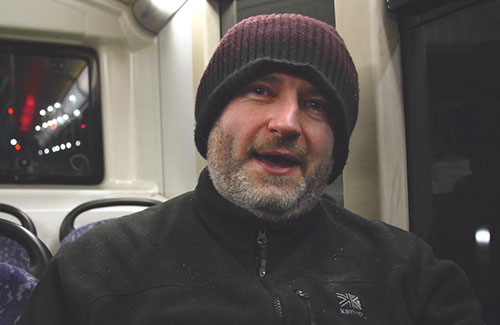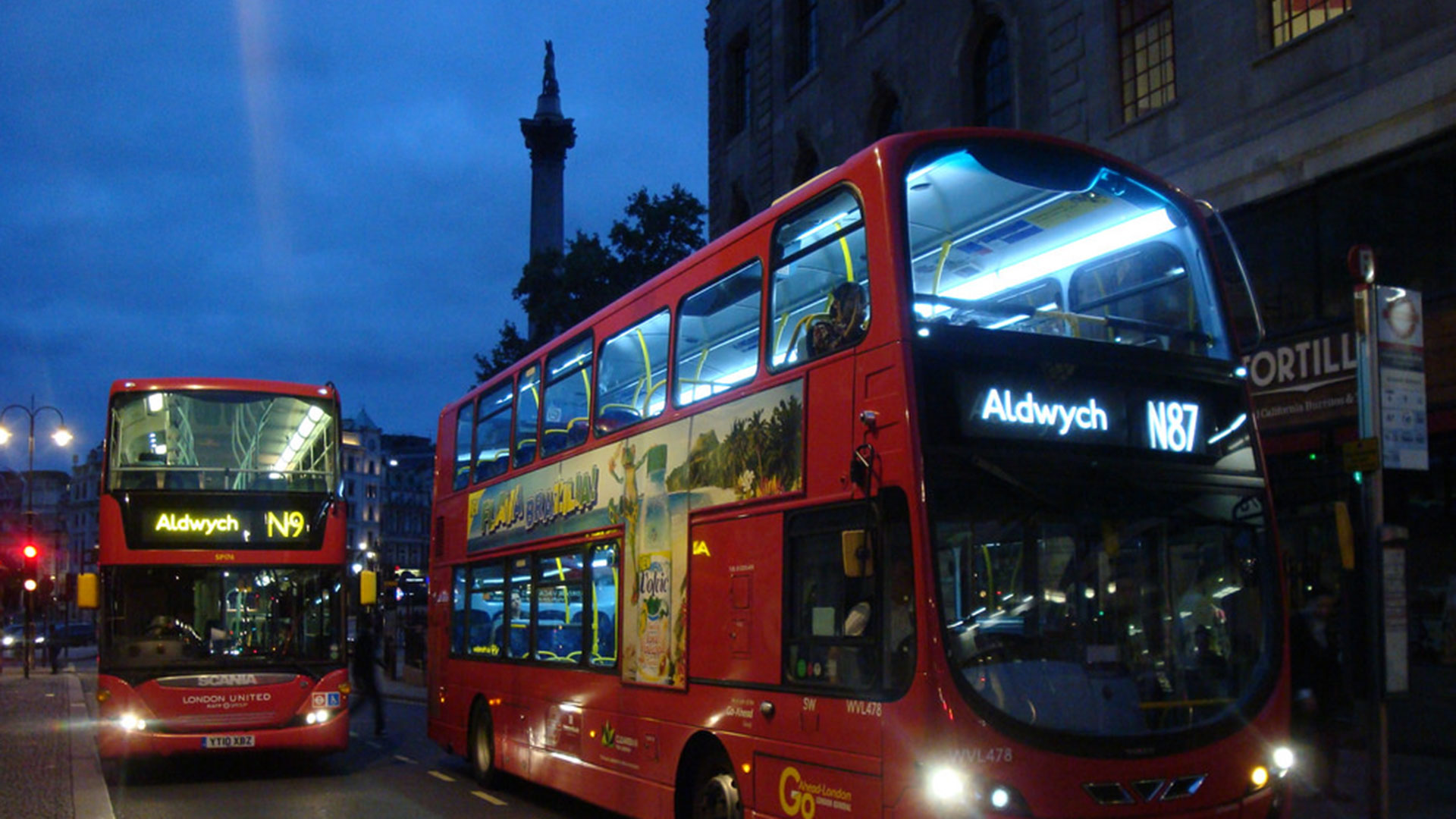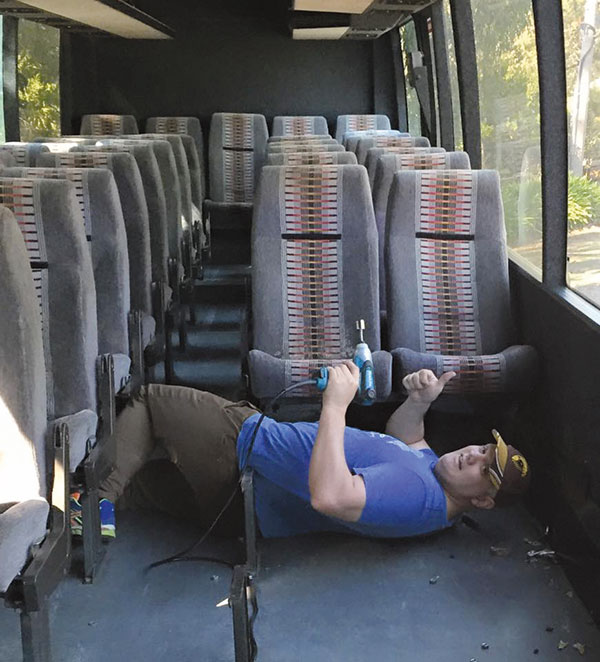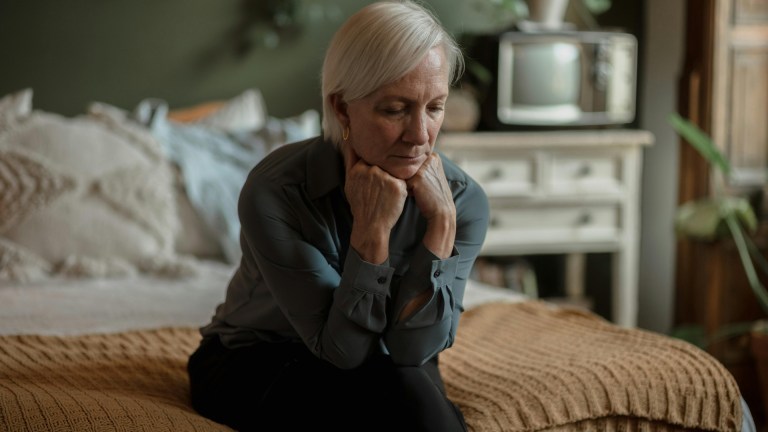Westminster has the highest number of rough sleeping reports, perhaps because many night bus routes begin in or pass through the borough. These routes are popular because of their long journey times, meaning a fraction more value for money and possibly even sleep.
In Westminster, average house prices are in excess of £2m (compared to the average house price in the UK of £204,368), and even working people increasingly cannot afford to rent. Gaz, 42, has been sleeping on night buses for almost two years, after moving from Melbourne a decade ago. Despite being employed part-time as a painter, London’s rents are prohibitive.
“I’ve been 25 years a painter and the irony is that sometimes I’m working in some of the wealthiest homes, and they’d never guess that I’m homeless,” he chirps. “One of the customers that I’ll be going back to is in Kensington – a ridiculous home. It’s amazing that people from that kind of background would normally have a fear of homeless people and yet because they don’t know of that background with me, they trust me.”
Severe budget cuts to local authorities has meant that homeless shelters are creaking under the strain of demand – there simply isn’t space for everyone. Last September, New Horizon Youth Centre, a London day centre that tries to find emergency accommodation for vulnerable young people, was forced to start giving out bus passes.
Shelagh O’Connor, the charity’s director, says the decision to give out bus tickets was a last resort. “If I’ve got a young woman here on Friday evening and we’ve nowhere to put her then her safest bet is actually being on the night bus,” she explains. “Young people can be exploited quite easily and are at risk.
Our 2020 Impact Report
The Big Issue has given more than £1 million support to Big Issue vendors struggling due to the lockdown restrictions. To mark the significant milestone, we have published an impact report, documenting the seismic shift the organisation has undergone in the past 12 months.
View ReportAdvertising helps fund Big Issue’s mission to end poverty
“We need more investment in emergency spaces. If you have somebody rough sleeping even for a few weeks, you will see a deterioration in their mental health, in their whole physical well-being, perhaps turning to street crime or prostitution. I would like a cross-party consensus around homelessness and especially around the needs of young vulnerable people.”
It is a familiar story to Thomas, 20. He wants to be a screenwriter and describes himself as “quite good” at poetry. After sleeping rough for weeks, he was one of the lucky few to be housed via New Horizon Youth Centre.
I didn’t know where to sleep. I didn’t know any safe spots around London
“I got kicked out in the morning and I thought by the end of the day my mum would have called me up and been like, come home,” he explains. “When it got to the first night, reality sank in – I am actually going to live homeless for however long. That was scary. I didn’t know where to sleep. I didn’t know any safe spots around London. I lost a lot of weight. You start to feel it, it becomes really draining because two hours of sleep a night for a month can really mess with your head.
“Everyone thinks a homeless person wears tatty clothes, stinks and is begging on the streets,” he continues, “but one of my closest mates is still sleeping rough and he dresses smart every day. He knows that you’re not going to get anywhere if you don’t make an effort.
“Talking to my dad, he said 20 or 30 years ago if you’re young and become homeless you go to the council and they could sort you out in a flat in a week or two. Now there are so many empty houses and so much accommodation being built, but not at prices people like us can afford. It’s all private investors building multimillion pound flats for multimillion pound people.”
Anthony Akers, head of bus operations at Transport for London, acknowledges the problem of rough sleeping is not confined to certain groups of individuals in the capital – like Gaz, workers on low wages who can’t afford to rent are increasingly reaching for desperate solutions. “A lot of people think of rough sleepers as people who have drink and drug issues, where actually the majority of them don’t – it could be a personal break-up, or a loss of a job. They’ve just fallen on hard times. Some people even work, that’s the weird thing, but they’re on such low paid jobs they can’t afford to pay rent anywhere. It’s a serious issue that we’re trying to tackle,” says Akers, “but there are limits to what we can do.”
Advertising helps fund Big Issue’s mission to end poverty
The number of homeless people sleeping on buses is part of a wider trend, with rough sleeping as a whole in London increasing 126.51 per cent since 2010, according to government statistics, as well as there being 17,180 people now classified as statutorily homeless.
Young people are particularly at risk because, for example, you can’t qualify for the London Living Wage until the age of 25. And, at the moment, the government is considering removing the housing benefit for 18- to 21-year-olds, further reducing support for that age group.
If Sadiq Khan, London’s newly elected leader, is to fulfil his promise to be “a Mayor for all Londoners” then he has a lot of work to do. The average price of a home in London has broken through the £600,000 barrier, and has almost doubled since 2009, according to leading property firm, LSL. The number of people becoming homeless due to the ending of shorthold tenancies – the type most commonly held by private renters – has increased more than 700 per cent since 2009/10.
A spokesperson for Sadiq Khan describes the findings of my report into night bus rough sleeping as “shocking”.
This report is yet another example of the previous Mayor’s failure to deal with the housing crisis
“This report is yet another example of the previous Mayor’s failure to deal with the housing crisis and, particularly, homelessness in London,” they said. “Sadiq Khan will be working closely with government, Transport for London, local authorities and the voluntary sector to tackle the issue of rough sleeping in the capital.”
Advertising helps fund Big Issue’s mission to end poverty
Just the ticket?
An Australian entrepreneur is trying to solve the homelessness problem in his country by converting old buses into shelters. Simon Rowe, who has experienced homelessness himself, hopes his ‘Sleepbuses’ could help people get a good night’s rest.
“Sleep changes everything,” is Rowe’s mantra. “The more I developed and researched a solution, the more I discovered what a good night’s sleep can do for a person’s physical and mental health. Just being able to sleep through the night, warm and safe, can give a person a whole new outlook on life. The least we can do is provide safe overnight accommodation to people sleeping rough in Australia, until they get back on their feet.”
Simon Rowe converting his first Sleepbus
Each vehicle will have 22 sleep pods, toilet facilities, lockers, chargers and even kennels for pets. Converting a bus costs around £25,000 but that is much cheaper than building a traditional shelter from scratch.
Rowe has just raised enough for the first Sleepbus through crowdfunding but estimates it would take 300 to be able to accommodate every rough sleeper in Australia.
Advertising helps fund Big Issue’s mission to end poverty












